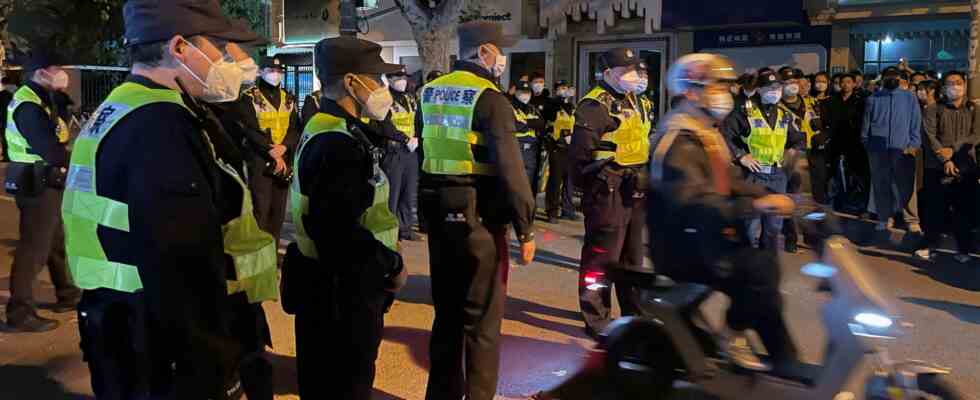Status: 28.11.2022 8:00 p.m
Things have calmed down in China after protests against the zero-Covid policy over the weekend. Only a few people demonstrate. The Chinese security apparatus works – and protects President Xi Jinping.
This time the Shanghai authorities are prepared. High barricades are erected along the streets before daybreak. Patrol cars and police officers line the streets exactly where people protested against the corona measures in China at the weekend. This is to prevent further demonstrations. The city also wants to deter people with arrests.
The police presence has increased significantly, controls have been tightened again, not only in Shanghai but also in the capital Beijing.
No departure from the zero Covid policy
What the protesters are demanding is a move away from the zero-Covid policy. But there won’t be. “We believe that with the leadership of the Chinese Communist Party and the unity of the Chinese people, our fight against Corona will be successful,” Zhao Lijian, a spokesman for China’s Foreign Ministry, said at a news conference today.
At the same time, there were minor concessions: In Beijing, students at some universities are apparently now allowed to leave the campus after they had previously been in lockdown for several weeks. There had also been protests at universities.
Experts: Vaccinations are the only way
Experts see vaccination as the only way for China to get out of the pandemic. So does Alicia Garcia Herrero in Hong Kong. She is chief economist of Asia Pacific at French investment bank Natixis. She looks at the displeasure of the Chinese population from an economic perspective. The corona measures put a heavy strain on the Chinese economy, says the economist. Many people have lost their jobs and have less money because they have less income. Overall consumption is weak.
“If China implemented a massive vaccination program, it would have a direct impact on the economy,” Herrero said. This could change market expectations a bit. “But even now I don’t hear anyone talking about the vaccinations.”
There are no major vaccination campaigns in the country with 1.4 billion inhabitants. Instead, people in China have been living with recurring lockdowns, mass tests, exit and travel restrictions for almost three years. Hundreds of people therefore protested against the strict corona measures over the weekend.
Complex Chinese security apparatus
One of the demands of the protesters: State and party leader Xi Jinping should resign. “It hasn’t been something like this for a very, very long time, where people physically take to the streets and formulate very specific concerns publicly and very loudly,” stressed Katja Drinhausen. She conducts research at the Merics China Research Institute in Berlin, primarily on Chinese domestic politics and society.
The protests are exceptional in China. Also because there is no freedom of the press and opinion and no right to demonstrate in the People’s Republic. Nevertheless, the demos, inspired by each other, take place at different locations in China at the same time. However, this cannot become immediately dangerous for state and party leader Xi Jinping. “The party state has built up a very complex security apparatus over the past decades.” The central pillars of the surveillance state with cameras and a relatively large number of police and internal security capacities are well known.
And the security apparatus also works on the Internet. There is nothing to be found about the protests in the state-controlled Chinese media, and the censorship authorities are quick to delete photos and videos from online networks. What the world sees in international reporting, the majority of people in China don’t see.
Protests in China: Visible worldwide, just not in the People’s Republic
Eva Lamby-Schmitt, ARD Shanghai, 11/28/2022 6:29 p.m

